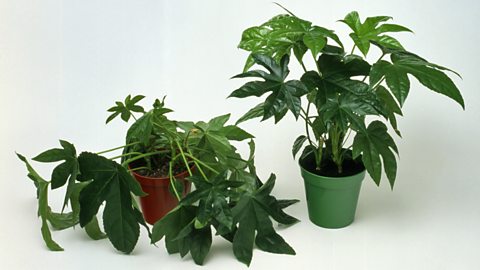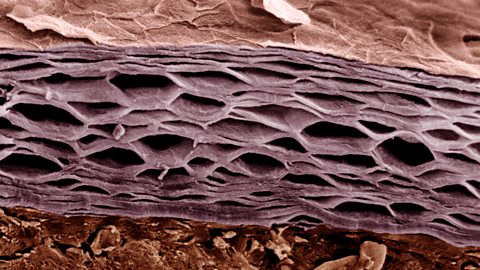Importance of water balance in the body
Water content in the blood
osmoregulationA form of homeostasis which controls the volume of water in the body. is the control of water levels and mineral salts in the blood.
Water levels and mineral salts in the blood are controlled to protect animal cells by stopping too much water from entering or leaving them. The concentration of water and salts is the same inside and outside of the cells. If body cells lose or gain too much water by osmosis, they do not function efficiently.
If the concentration of water is the same inside and out the cells, then there is no netThe overall effect of something when all additions and deductions are calculated. movement of water into or out of the cell. The cells remain in their normal state.
If the water concentration is too high outside of the cell then water enters the cell by osmosisThe movement of water molecules across a selectively permeable membrane from a region of higher water concentration to a region of lower water concentration.. If too much water enters, the cell will burst. If the water concentration is too low outside compared to the inside of the cells, water leaves the cells by osmosis. This causes cells to shrivel.

Water can move in and out of plant cells by osmosis in the same way that it can in animal cells. The plant cells are turgidEnlarged and swollen with water. Having turgor. Description of a plant cell in which the vacuole has swollen due to water gain by osmosis. or firm, when the cytoplasm is full of water. If plant cells lose water, they become flaccid and the cytoplasm shrinks away from the cell wall. This causes the plant to wilt.
Human excretory organs
The organs of excretion in humans include the skin, lungs and kidneys.
Water is lost from the body as:
- urine from the kidneys
- sweat from the skin
- water vapour, from the lungs when we exhale
Skin
Sweat glands in the skin produce sweat. Water, ionElectrically charged particle, formed when an atom or molecule gains or loses electrons. and ureaA nitrogenous waste product resulting from the breakdown of proteins. It is excreted in urine. are lost from the skin as they are contained in sweat.

Lungs
Water and excess carbon dioxide leaves the body via the lungs when we exhaleBreathe air out..
We cannot control the level of water, ions or urea loss by the lungs or skin. For example, in a hot climate, your body sweats to help keep you cool. In the same way, when we breathe out we lose water vapour, and we cannot alter the amount we lose.
Kidneys
The kidneys are organs of the urinary system. The urinary system removes excess water, salts and urea.
Learn more about water and nitrogen balance with Dr Alex Lathbridge.
Listen to the full series on ґуПуґ«ГЅ Sounds.
In this podcast, learn the key facts about water and nitrogen balance. Listen to the full series on ґуПуґ«ГЅ Sounds.